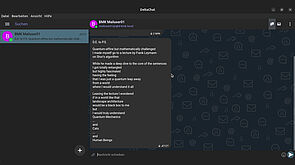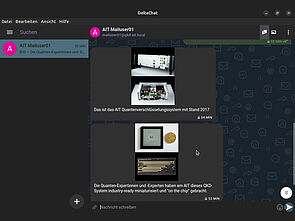On 23 February 2023, the AIT Austrian Institute of Technology and consortium partner X-Net Services GmbH, together with the Austrian Federal Ministry for Climate Action, Environment, Energy, Mobility, Innovation and Technology (BMK) as early adopter, demonstrated the future of highly secure communication in the public authority sector based on the world's most advanced communication and encryption technology. During a live demonstration, messages were exchanged via a chat between the AIT and the BMK. The encryption of this data communication was carried out technologically with quantum-secured cryptography. This enables the generation of a very high number of different, highly secure and independent keys and thus achieves a significantly higher level of eavesdropping security for both end-to-end secure data communication and data processing. Against the background of quantum computers that will be used in the future, this is an important future technology to ensure data sovereignty in Austria and in Europe in the long term. The development activities around this communication infrastructure set up for test purposes between the two actors mentioned, as well as the technology evaluation of quantum encryption in interaction with commercial systems, took place in the project "QKD4GOV - Securing government data using quantum-safe cryptography" (detailed information can be found here). The project addresses the transmission of confidential information between public authorities in various application scenarios and is funded by the Austrian KIRAS funding programme for security research of the Austrian Ministry of Finance (BMF).
Désirée Ehlers, Federal Ministry for Climate Action, Environment, Energy, Mobility, Innovation and Technology (BMK), Dept. III/5 - Key Technologies for Industrial Innovation: "Where Austrian cutting-edge research leads to application-oriented developments, an innovative and sustainable cooperation ecosystem of research, business and administration is needed. For this reason, the BMK actively participates as an associated partner in innovative quantum technology projects for the safe and profitable application of Austrian know-how and makes a future-oriented contribution to Austria's desired data and technology sovereignty."
Helmut Leopold, Head of AIT Center for Digital Safety & Security: "The AIT has successfully established itself as an important know-how and technology supplier in the EU for the future high-security European communication network. The cooperation with the public sector is a very important prerequisite for the development of an economic ecosystem and thus for the international establishment of high-tech made in Austria".
Nikolaus Dürk, founder and managing director of X-Net Services GmbH: "It is a matter of time before conventional encryption is no longer sufficient to adequately secure sensitive data and data communication. We are working to ensure that new technologies such as quantum cryptography not only become operational in the laboratory, but that real applications emerge that set a European standard."
The decisive factor for this high-tech success in the field of digitisation with cutting-edge technology from Austria was the many years of public funding for basic research. Based on the resulting groundbreaking research work of Professor Anton Zeilinger, the AIT focused very early on the industrialization of scientific findings in the field of quantum communication. As a result, Austria's largest application-oriented research institution is now internationally recognized as a specialist in terrestrial and satellite-based quantum cryptography. The AIT is a driving player and coordinator of major European research projects, such as the highly competitive European "Quantum Flagship" programme, which aims to develop quantum technologies for the mass market. This is not least because the miniaturization of the technology is an essential prerequisite for broad industrial applicability, which is why this development step has been a central focus of the work of AIT quantum researchers until recently.
Important contribution to the industrialization of highly secure quantum encryption
Now that this milestone has also been reached, in that the optical setups required for quantum encryption could be realized in a fully functional way on the size of 2x4 mm chips and the technology is thus ready for industrial use today, field tests are now being carried out on an ongoing basis - on the way to establishing a quantum communication network throughout Europe - with various European players from business, industry and the public sector as part of the European EuroQCI (European Quantum Communication Infrastructure) initiative. In this context, the AIT is coordinating the QCI-CAT project, which is funded by the EU and by the national "Fonds Zukunft Österreich", and which is advancing the development of a quantum communication infrastructure for high-security government applications in the EU and implementing concrete applications in Austria. Furthermore, the AIT is the lead partner in the PETRUS project led by Deutsche Telekom, in which the development of the EU-wide high-security communication infrastructure EuroQCI is coordinated. Here, a European cyber shield based on a quantum communication infrastructure, consisting of terrestrial and satellite-based solutions, is to be established over the next ten years. These EU initiatives with the strong support of Austrian know-how and technologies are an important contribution to sustainably ensuring EU data sovereignty in a global context.
Austrian quantum technologies in space
AIT technologies are also on board the current EU project to build a European satellite communication network for encrypted internet called IRIS2 (Infrastructure for Resilience, Interconnectivity and Security by Satellite), which complements the fibre-optic-based terrestrial EuroQCI networks: In the coming years, up to 170 satellites are to be launched into orbit. The primary goal is to strengthen autonomy in space and thus create alternatives to initiatives such as Starlink, which are essential, for example, for disaster control or relief operations. In addition, infrastructurally insufficiently supplied regions such as Africa or the Arctic are to be connected. In order to guarantee the security of data traffic, quantum encryption methods will also be integrated here. More than six billion euros are being invested in a public-private partnership model.
Enquiry notice:
Michael W. Mürling
Marketing and Communications
AIT Austrian Institute of Technology
Centre for Digital Safety & Security
T +43 (0)664 235 17 47
michael.muerling@ait.ac.at I www.ait.ac.at
Michael H. Hlava
Head of Corporate and Marketing Communications
AIT Austrian Institute of Technology
T +43 (0)50550-4014
michael.hlava@ait.ac.at I www.ait.ac.at




